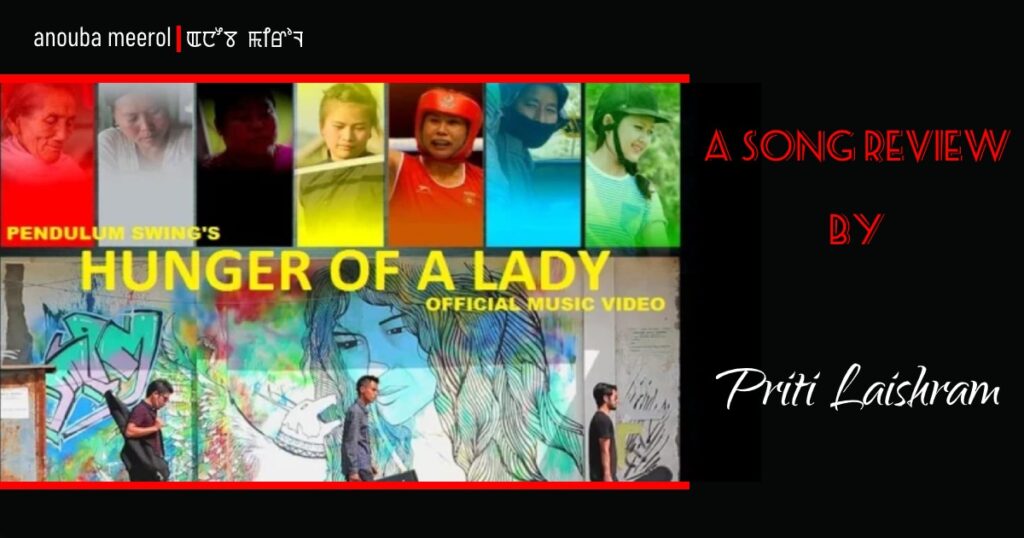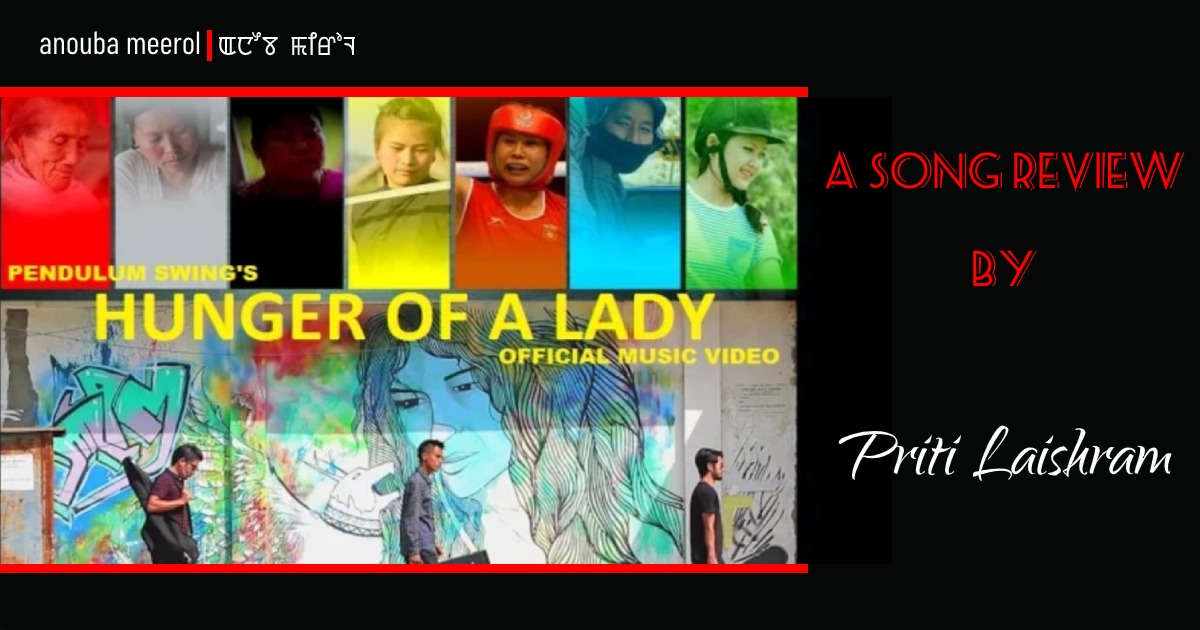
On Everyday
The song “Hunger of a Lady” is by a band named Pendulum Swing. Pendulum Swing is an Imphal based rock band formed in 2012. The song is written by the frontman of the band, Laipubam Bhabananda (Vabe) and is part of their first album ‘Life is beautiful’. It was released on 12th October 2014. The music video was uploaded on Youtube on 9th August 2016. The song is dedicated to Irom Sharmila and the women in Manipur. The story revolves around women’s strength under constant strains and struggles; the contribution they make both inside their homes and outside. There is a constant negotiation they have to engage in both the spaces. The song incorporates a historic event of resistance against state violence, i.e Irom Sharmila’s struggle, and the everyday struggles. For a split second, Irom Sharmila appears in the video where she is in a tussle with the state forces who are trying to arrest her. The event (struggle against state violence) ruptures the story; the story of struggles of multitude of women, a polo player, a keithel kabi ema, an auto-rickshaw driver, a mechanic, a thang-ta practitioner, a boxer, a weaver, in their everyday lives.
I choose this song because this song allows me to address how everyday struggle is overshadowed by stories of historic struggles. The stories of well-known women and women’s collective always come before everyday struggles of women whenever we discuss women of Manipur and are also used as a blanket to shield the unseen everyday struggles. The focus on the story of Irom Sharmila’s struggle for the repeal of Armed Forces Special Powers Act -1958 or the courage and sacrifice of keithel ema-s and meira paibi-s in political movements of Manipur even undermines the everyday struggles of these women. We find these acts of overshadowing and glorification, be it on social media, print media or in academia. In the eyes of the world, women who have managed to get recognition for their struggle have always been considered more worthy of appreciation than those who are struggling silently. The song includes both Irom Sharmila and the multitudes of women who struggle and toil in order to make a living in their everyday lives. We must point out here that Irom Sharmila does not define or represent the multitudes of the struggle of all women in Manipur. It is an impossible task to do so. The struggle of Irom Sharmila cannot be seen in the same light as the daily struggle of these seven women and many others. The nature of the struggle is different. The question then arises, whether it is right to club Irom Sharmila’s struggle with the everyday struggle of every woman in Manipur.
On Breaking Traditional Norms
The song does justice to the less known, unheard, unseen and veiled! The video shows seven women from different walks of life narrating their stories. It includes the interview of a Jetholia Thongbam (a polo player), Bihari Laipubam (a keithel kabi ema), Laibi Oinam (auto- rickshaw driver), Premila Sandham (a mechanic), Lamjingleima Chanu Saikhom (a thang-ta practitioner), Sarita Laishram (a boxer), Elizabeth Hongsa (a weaver). Premila Sandham, the mechanic says, “kanagumbanasu nupi na tyre photpa haina noknaba kaya amsu yaowe. Eigi epangal na ei humang mamal na eigi echa esu thakkani [Some people laugh because a woman is stitching tyres. With my strength and my labour I will feed my Children]”. Laibi Oinam, an auto-rickshaw driver says, “ahanba thokpasidadi mina yam noknei. Tin bhuk sitpa yaowi misu tong-u pak na yade [When I came out for the first time, people laughed at me. They even spat on me, they won’t even take the ride].” They tell how they had to overcome fear and shame to feed their family. They narrate the struggle they faced while choosing a profession less known to be preferred by women. And what it meant for them.
The music video is beautifully made with women narrating their stories, of some following their passion and some leaving a known space to provide for their family. We often read about women who come to the forefront in times when the head of the family, considered and understood to be a man, fails to fulfil his ‘duty’. Women are constantly defined and given a space only when the man fails and she becomes a symbol of sacrifice, not understanding or considering their struggle in a deeply conservative patriarchal society. Interestingly, none of these women who were interviewed in the video mentioned anything about them being a symbol of sacrifice, or about how incapacitated their husbands are.
On the Lyrics
“One day she began to change her mind
Oh! She realized the time isn’t right
For you and me to keep dancing around
‘cause the noise of gunfire is way too loud. ”
The songwriter portrays a woman’s sudden realization of her social and political milieu when he writes “one day she began to change her mind”. There seems to be a problem as we do not suddenly realise it but we are born into it. We are all born into “the noise of gunfire,” women and men dying all around, women protecting their children, women trying to earn their living and women fighting with their brothers, their fathers, their sons and one another.
The song is also a plea to people asking them to understand the plight of these women. The songwriter tries to evoke a sense of urgency, not only an urgency to share a refuge but to understand the need of it. He writes:
“Could you share your place to hide?
Am I asking a little too much?”
When I asked the writer why he wrote that there is a need to “share your place to hide,” he said the song is “open to interpretation”. Why do we need to hide? From whom are we hiding? Does hiding make the situation any better? These women, the warriors of everyday struggles, did not seek refuge, on the contrary, some of them came into what is generally regarded as male oriented spaces.
When asked why he sings in English, the singer says that he wants to reach out to people outside Manipur (not specifying a particular group). He wants the world to know about the problems the people face in this region. It seems there is an implicit realisation that there is a need for acknowledgement, not just from the world here, but from the world which speaks English.
At the end of the video, some of the women leave behind messages for the young girls, who will watch or hear this song. Their messages reflect the lives they were/are living. Coming from them who have faced hardship and are struggling, breaking the traditional barriers, not letting others decide their lives for them and acknowledging their strength and weakness, they are indeed inspirational for not only young girls but for everyone. The messages are:
Laibi Oinam, the auto driver: “Nupi su thouna lingjel leigadabani [Women also need to have strength and will power].”
Premila Sandham, the mechanic: “Mapanganna suja nomjaraga akhoi hingadabani [We should earn our living with our labour].”
Bihari Laipubam, keithel kabi ema: “Su nommu si-dani akhoi hairibaibu [We should all work hard, it is all that we are saying].”
– Priti Laishram

A review so deep and straight to the point, about how women have always been given only certain job/ places in our society. And how the song shines a light on these exemplary women/ heroes who defy such norms.